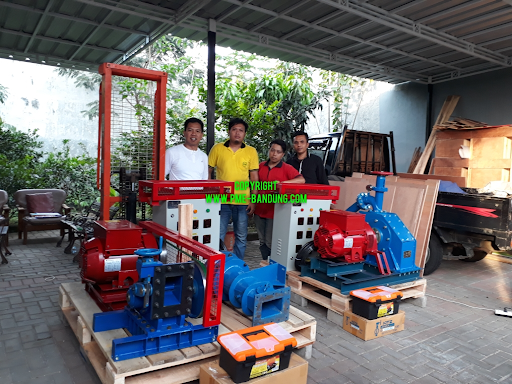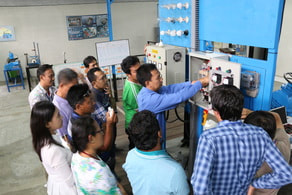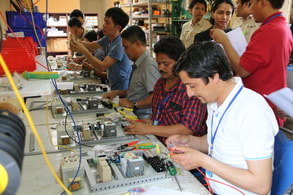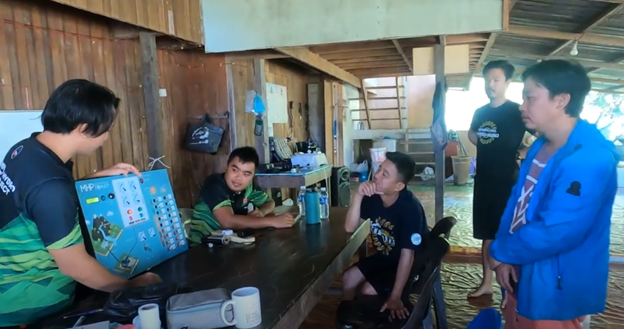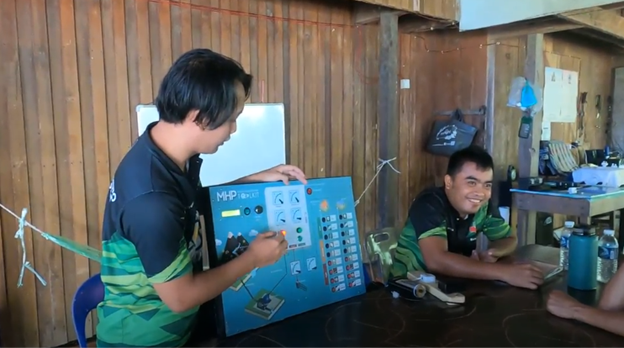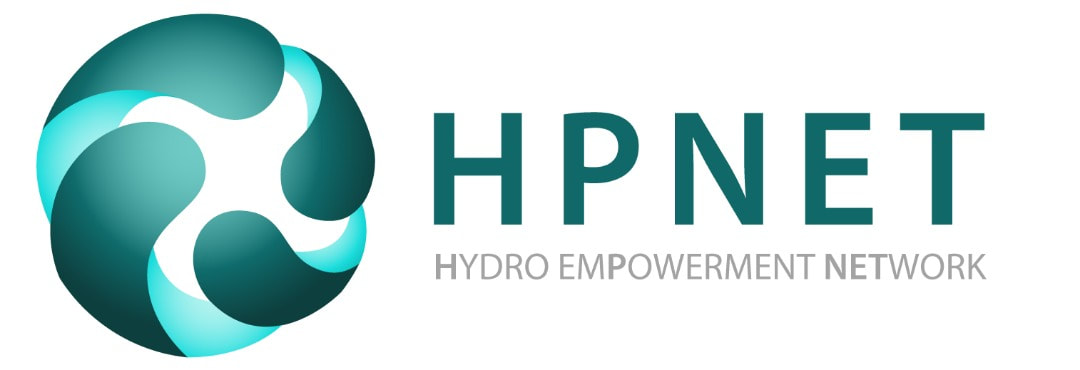| Protel Multi Energy (PME) was incorporated in early 2011 by Mr. Komarudin, an electrical engineer with a strong background in renewable energy, and a passion for small-scale hydropower, cultivated over 15 years. Previously, Mr. Komarudin worked with Entec AG, a Swiss consulting and engineering company specialized in small hydropower. Experienced with worldwide projects in technology transfer, he has provided assistance in developing countries, especially in crossflow turbine (T14/T15) and controller technology. |
|
Public, non-government, and private sector actors each play important roles in the small-scale hydropower landscape. We are often inspired by the tenacity of locally-rooted, private entrepreneurs who are unperturbed by the challenges that come with establishing and running a financially viable business that also serves rural communities. In this guest blog post, we hear from Mr. Komarudin, an entrepreneur who wears many hats as a manufacturer, developer, technical consultant, and micro hydro champion in Bandung, Indonesia. He introduces us to his business, Protel Multi Energy (PME), which has been supporting rural energy access for over a decade. Protel Multi Energy focuses on the manufacturing of affordable Digital Electronic Load Controllers (ELCs), as well as micro hydro and pico hydro turbines (crossflow and Pelton) for rural electrification all over the world. Besides product manufacturing we also assist villagers and project owners in planning and designing micro hydro schemes. Sometimes we offer technical supervision on construction and installation. We are also able to do turnkey projects under certain circumstances. Our ELCs are being used in more than 900 micro hydro sites in 5 continents and more than 30 countries worldwide, with a projected total installed capacity of about 10MW by the end of 2021. Our projects are mostly financed by donors, government agencies or the private sector, as off-grid renewable energy projects for rural development. Nowadays, especially in Indonesia, we are developing many micro hydro projects through Dana Desa (village funds). We often provide support for each stage, starting from site survey, to planning and design, project supervision, supply of equipment and post-installation management. Due to their lack of knowledge and experience, we assist villagers to develop their project as their own responsibility, under our supervision to make sure it runs well with a sustainable approach and reliable equipment. To learn more about PME and access many useful tutorial videos, visit our YouTube channel!
0 Comments
Electronic load controllers (ELCs) are a critical component of micro hydropower systems, which keep turbines, generators, and the energy they produce within safe operating ranges, as loads are switched on and off. ELCs can prevent damage to appliances and micro hydro components and even mitigate fire and electrical hazards. Despite their important role, ELCs are generally the least understood component of micro hydro systems. Equipment selection can be particularly challenging if practitioners are unfamiliar with the different types of ELCs and their relative merits.
To help demystify ELCs and ease the equipment selection process, our Controllers and Load Management Work Stream has developed an easy-to-follow factsheet. This “Basics of Electronic Load Controllers (ELCs)" tool provides a useful background on electronic, automatic and manual flow control, with pointers on their relative cost and suitability in different contexts. Specific types of ELC designs are further illuminated, as well as ballast/dump load types and control methods, commissioning checks, and useful questions to ask of suppliers. Check out the “Basics of Electronic Load Controllers (ELCs)" at this link. We extend our thanks to Work Stream contributors Ajith Kumara, Bob Matthews, Dan Frydman, Jiwan Kumar Mallik and Rams Vaidhyanathan. For more useful tools, check out our Micro Hydro Toolkit for Practitioners, which includes a DIY ELC Simulation Tool designed to help train local operators! TONIBUNG, TObpinai NIngkokoton koBUruon KampuNG (Friends of Village Development), is an indigenous-lead non-profit organisation dedicated to the development and promotion of renewable energy and appropriate technology in Malaysia. To advance its mission, Tonibung has established the Center for Renewable Energy and Appropriate Technology (CREATE) in Kota Kinabalu.
In July 2020, the Tonibung team conducted a training for 9 village operators and community members of the Kobulu Micro Hydro Project. Supported by the WISIONS initiative, the training aimed to enhance the operators’ skills on micro hydro load management, using hands-on and do-it-yourself knowledge tools developed for operators and communities. The objectives of the course included:
Have you seen our Micro Hydro Toolkit for practitioners? With support from the WISIONS SEPS, in partnership with Tonibung and Green Empowerment, HPNET has developed a set of technical tools for small-scale hydro practitioners. These practical tools, made by and for practitioners, include our Micro Hydro Standards Tool, Practitioners Database, Do-It-Yourself (DIY) "Canary" Load Indicator Device, DIY ELC Simulation tool, and our HPNET digital app. We’re excited to introduce three new informative videos describing the ELC Simulation Tool and Canary Chic Load Indicator Device: DIY Electronic Load Controller (ELC) Simulation Tool A lack of local knowledge of Electronic Load Controllers (ELC) is often the reason for micro hydro shutdown. HPNET's Do-it-Yourself (DIY) ELC Simulation Tool is a physical device designed to help train village operators on the functionality of ELCs. Watch the video for a snapshot of how the tool can be used to simulate load patterns and demonstrate the role of an ELC in regulating load. Micro Hydro Toolkit App The MHP Toolkit app is a graphic-based tool to help you understand basic, as well as in-depth technical aspects of community-scale hydropower. The app includes a digital version of the ELC Simulation Tool, described above. It also provides a micro hydro trouble-shooting guide, walking the user through tips and tests to solve issues ranging from over-voltage to unidentified noise coming from the powerhouse. The tool can be downloaded on Android and Windows. This video provides a useful overview of the functionality of the MHP Toolkit app and all that it can offer practitioners. Canary Chic Load Indicator Some Micro-Hydro systems with a high electrical demand or lack of water resource can suffer from service interruptions. As consumers connect more appliances it can be difficult to know what the available capacity of the system is at any particular time during the day. We set out to design a simple, low-cost, open-source device that can provide some insight for the consumers into when a system is reaching full capacity and therefore in danger of triggering a blackout. This video gives a brief introduction to the device, how it works, how you can access the design materials, and how to make it most effective for your Micro-Hydro systems. A common cause of power outages in communities with micro hydropower systems is when the demand on the system is too high. Residents are often unaware of their energy usage leading them to connect more appliances than can be supported. This causes the safety systems to disconnect the supply, causing the shutdown. Through collaboration between Tonibung, Green Empowerment and HPNET, and funding from the WISIONS Sustainable Energy Project Support (SEPS) grant, an open-source design for the device was conceptualized, aimed at enabling local practitioners to manufacture it themselves. The load indicator was envisioned to be a simple plug-and-play device that can be fitted in any regular household socket. When the micro hydropower system is nearing a critical threshold, the device will sound an alarm warning consumers that further usage of appliances will overload the system and cause a power outage. Learn to build your own Canary Load Indicator Device here at this link. Learn about Open Source Technology for Community-based Renewable Energy here at this link. |
Categories
All
Archives
February 2023
|
